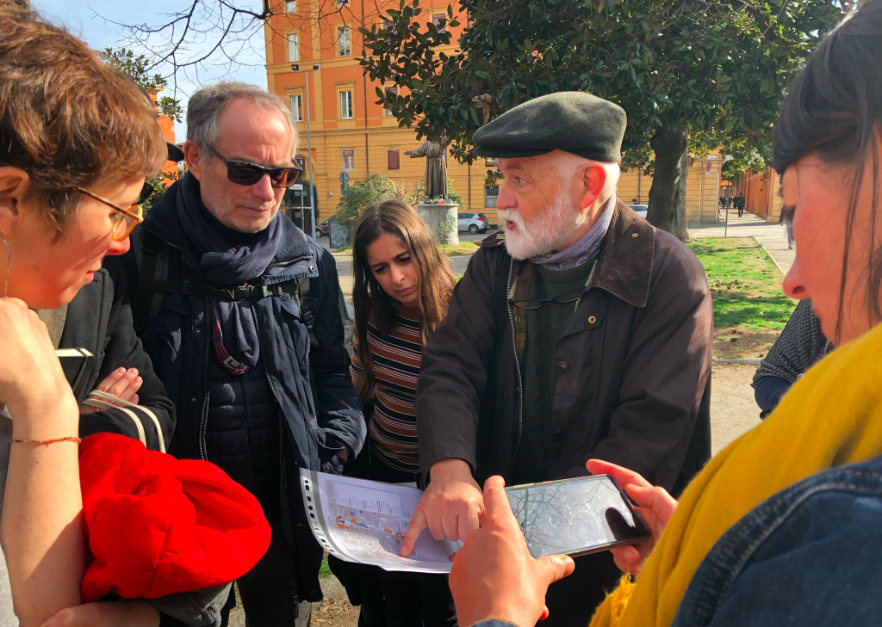In a time when old systems are tightening, when borders are sources of tensions, 8 public and civil society stakeholders* have joined their forces, with the support of the European Erasmus programme, to draw inspiration from the experiences conducted in Europe in the field of these new forms of governance called “common”. This movement is blooming in Europe, gradually involving elected representatives and public administrations, from whom it must find support and legitimacy to continue growing. Potential vector for revitalizing local citizenship? Alternative path between public management and market economy? Transformation lever for public administrations? Opportunity for new political narratives to emerge? These are some of the questions we are looking forward to exploring in this two-year project: Enacting the commons – How do the commons transform public action in Europe ?
As our cities see challenges multiply, mistrust of political institutions increases, local governments see their resources decrease and people demand renewed forms of engagement in city’s life, everywhere in the world, and especially in Europe, civil society organizations, cities and regions are exploring the issue of “commonalities”. By common, we mean a resource that is shared, managed and maintained collectively by a community; the community establishes rules in order to preserve and perpetuate this resource while providing the possibility of using it by all.
In several Italian cities, it is citizens’ groups that organize themselves to take charge of and animate, with the support of municipalities, cultural or heritage sites, natural spaces, social services, resources such as water for example. In the Netherlands, citizen renewable energy cooperatives that offer new energy management opportunities in conjunction with public actors. In Gent, a major transition plan to the communes launched by the city with the help of the Peer-to-peer Foundation, which is reflected in its policy towards the temporary use of vacant spaces. All these initiatives, among many others, are exploring, between state control and market mechanisms, a third way to rethink the collective management of so-called “common” goods, involving new economic, legal, political, relational and other approaches.
What about France? While the movement is also growing, local authorities are timidly involved in it, in a cultural context where the preponderant role of the State may leave less scope for imagining more composite scores as an alternative to the public/private dichotomy. However, we can also speak here of a “moment of the commons”; more and more cities are seeking, like Brest, Grenoble, or the European Metropolis of Lille, to put this notion “into action”. The context of the democratic and social crisis is encouraging administrations to experiment with more resilient, open and cooperative models. “In a common management, we put everyone around the table and reinvent the forms that this table will have,” describes Xavier Perrin, who brings this subject to the heart of the City of Grenoble.
There is indeed a challenge for public authorities to be in motion and to respond to the transformations taking place in societies: search for more horizontal decision-making methods, new ways of acting in response to major issues such as the ecological crisis; desire to re-appropriate resources, in response to forms of privatization for example (public space, natural resources, etc.); need to include the plurality of stakeholders, to pose diversity as a factor for enrichment and to invent new forms of social justice, etc. “The commons are not “the” miracle solution but represent an opportunity to rediscover a collective action locally, by uniting creative complementary wills, as well as to embrace new values of sharing, resilience and care for others and the environment. “explains Gilda Farrell, Head of the Social Cohesion Division at the Council of Europe
In some cities, the questioning is initiated by participatory budgets, for example, which introduces broader challenges within the local government administration: how to create the transversality and cooperation necessary to transform these citizens’ wishes into reality on the territory? Finding organizational and institutional solutions to involve the residents in the continuity of the projects and to federate the energies for that purpose? Test new legal and technical forms to get out of a state of verticality, where everything is governed by prohibitions or property rights, to allow experimentation, shared use, etc.? Repositioning public action and its agents, especially these who are in contact with inhabitants on a daily basis, in new roles and inventing new interfaces with users to co-produce the city, while avoiding public disengagement or new appropriation? How do these projects contribute to new narratives of the territory, how do they allow to embody meaning, without participating in a new “commons washing”?
In this context, Enacting the commons will allow us to lead 8 learning expeditions to meet inspiring initiatives in Europe.
Two years to draw inspiration, create and share knowledge on these initiatives or existing reflections (such as the work on capability commons created by researcher Geneviève Fontaine for example);
Two years to initiate, modestly, a movement: it is not a question of making commons the new buzz word, but rather of strengthening emerging or runing initiatives by allowing these to connect, by showing what’s possible, etc..;
Two years, finally, to imagine next steps, cooperations and experimental fields….
If you want to know more and follow the project, follow the website: http://enactingthecommons.la27eregion.fr, watch twitter #commons @EnCommons, or write to us at sbois-choussy@la27eregion.fr
And to find the first expedition, which takes us to Italy and has just started, it is here.

